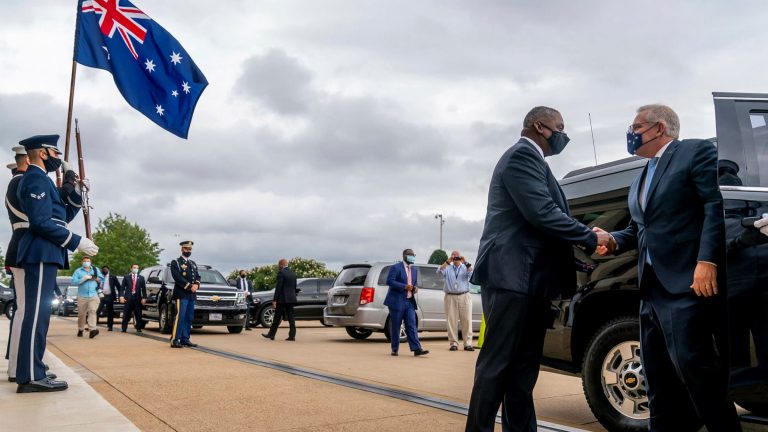The dust hasn’t yet settled on the deal between Australia, United Kingdom and the United States (AUKUS). Commentors are presenting different points of views about this agreement, bringing to the table various pros and cons. It seems that not many of them are putting enough weight on one of the most crucial aspects. Before we dive int it, let’s summarize the state of the game.
What AUKUS has changed?
The submarines
Of course, the most obvious change is the submarine type. For years the situation was clear. Australia is buying French designed, specially tailored subs that will replace the ageing Collins class boats. Although until September 2021 this was the plan, let’s not pretend that it was going smoothly. The Australian Ministry of Defence and the government was sending signals that the Franco-Australian deal is a rough ride to say the least. There were cost overruns, delays, and hesitance to more openly and broadly include the local industry into the building process. We should also take into account that the original French base submarine project was nuclear based, but converted to diesel as per the Australian request and need at the time of signing the original contract.
The relationships
Obviously the relationships with France have collapsed. The voices that came from Paris after revealing the deal were very harsh. But to be honest, from an Australian perspective these are words without any significant weight. France would like to be considered as a global power and although it has some influence and interests in the region, it has absolutely no leverage to be a major player in the Pacific.
Australia is changing France, a distant player, with minor actual influence in the region, to a local player, with a major influence in the region. Of course, we don’t know if this decision will be good in the long term, but from Australia perspective it might be better to walk with a stronger ally.
Why the old submarine contract is bad, and the new submarine contract will be good?
The simple answer is because the situation has changed. Previously, classic submarines was what the Australians needed. They were replacing diesel powered subs with diesel powered subs, and this made perfect sense. The Collins class has served well and did its job as expected, but nothing can last forever, so the submarine contest was started and France won, beating Japan and Germany.
Fast-forward to 2021, and we live in a very different environment. In the vast areas of the Pacific Ocean, Australia needs much more operational freedom. There is the tyranny of distances out there, and diesel submarines can’t sail for prolonged times. They have to be refuelled and can’t stay on station long enough. Australia now wants or possibly even needs to be more active in the region, and with nuclear-powered submarines it can achieve its goals.
Why the new submarine contract might also be bad?
The short answer is that because it will take time to deliver them. A lot of time. By the time they all are on station, they might not be as need or relevant to the projection of power as they are today and in the next 5 to 10 years. Prof. Roger Bradbury has hit the nail on the head in a 2020 paper, stating that the detection of submarines might get a lot easier and therefore their lethality might be much smaller.
We should also take into account the current technical revolution. New Australian submarines will be delivered in a perspective of two decades when taking into account the decision process, building, training, obtaining readiness and learning to live with a nuclear-powered navy.
Where will the technology be at that point? Does anyone remember what type of phones we had 10 years ago? Looking even further back, 15 or 20 years ago from today’s perspective looks like a Stone Age in many aspects. Therefore, we can assume that Australia is gambling a bit with this deal, but we also have to state that the French submarines in many aspects would be even worse.
There are also voices that considering the termination costs of the old contract, the costs of the new contract and the overall costs of the nuclear shift are not worth it. It could be better to buy more diesel powered submarines and have more flexibility in near seas operations than Australia will have with just eight boats in far sea operations.
The critical question. Why was the new AUKUS deal inked?
Looking at the situation from far away, it looks like Australia is really afraid about its future. It has decided to ditch a good relationship with France and buy itself into the US alliance. Obviously the threat is from China. From Canberra’s perspective, walking alone or with France was a no-go. If China will be growing as fast as it grows right now, Australia will fall in its sphere of influence.
In the long run it could become so interconnected and dependent from China that in a few decades it might lose the level of independence that it is enjoying right now. This seems as the main reason. It’s not about the difference those eight subs will make in the region, it’s about picking sides in the future Game of Thrones in the Pacific. Australia has chosen.
Post Author
Author
-

Ph.D. in liberal arts in the field of military history, specializing in military aviation, analyst in the field of military aviation, defense, modern warfare geopolitics and security.
View all posts







Pingback: State of NATO. Alive, stagnant or dying? - Robert Lansing Institute